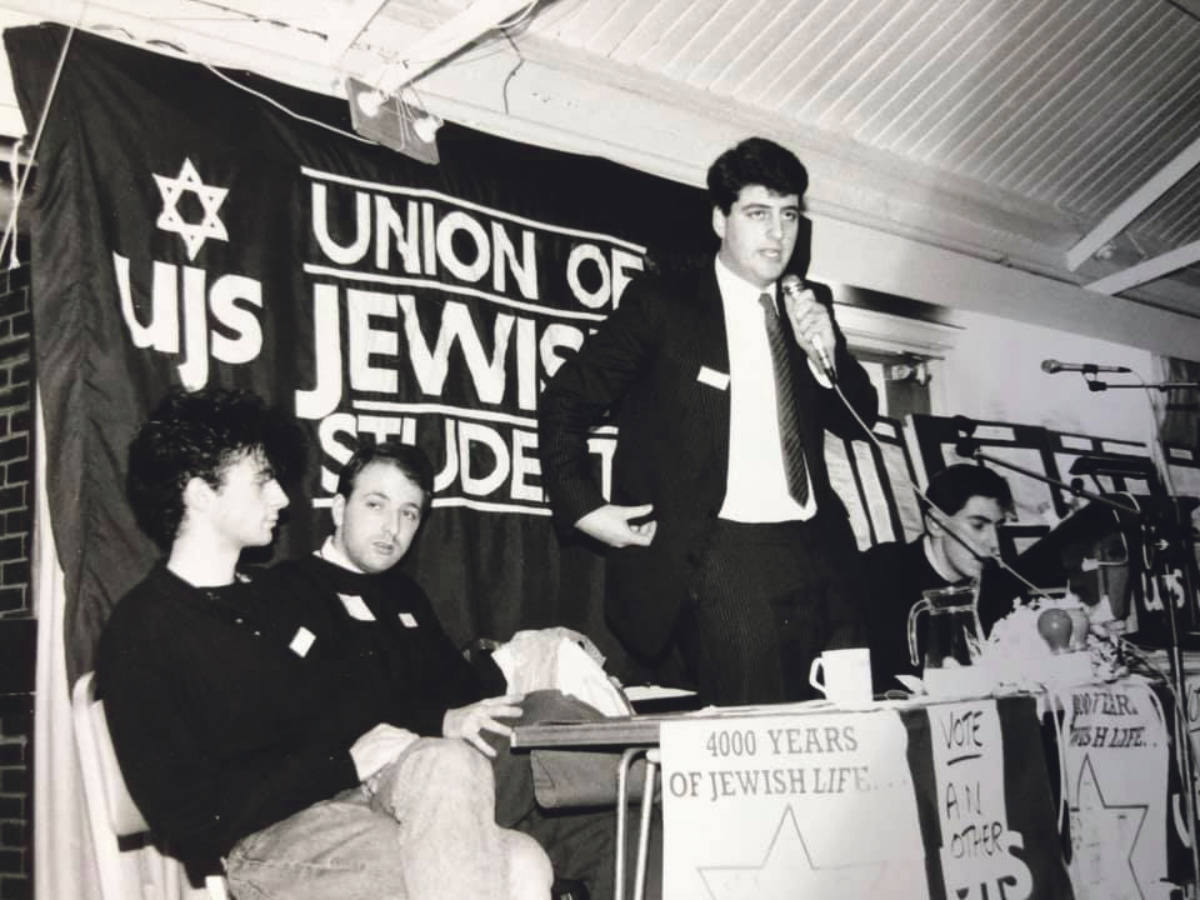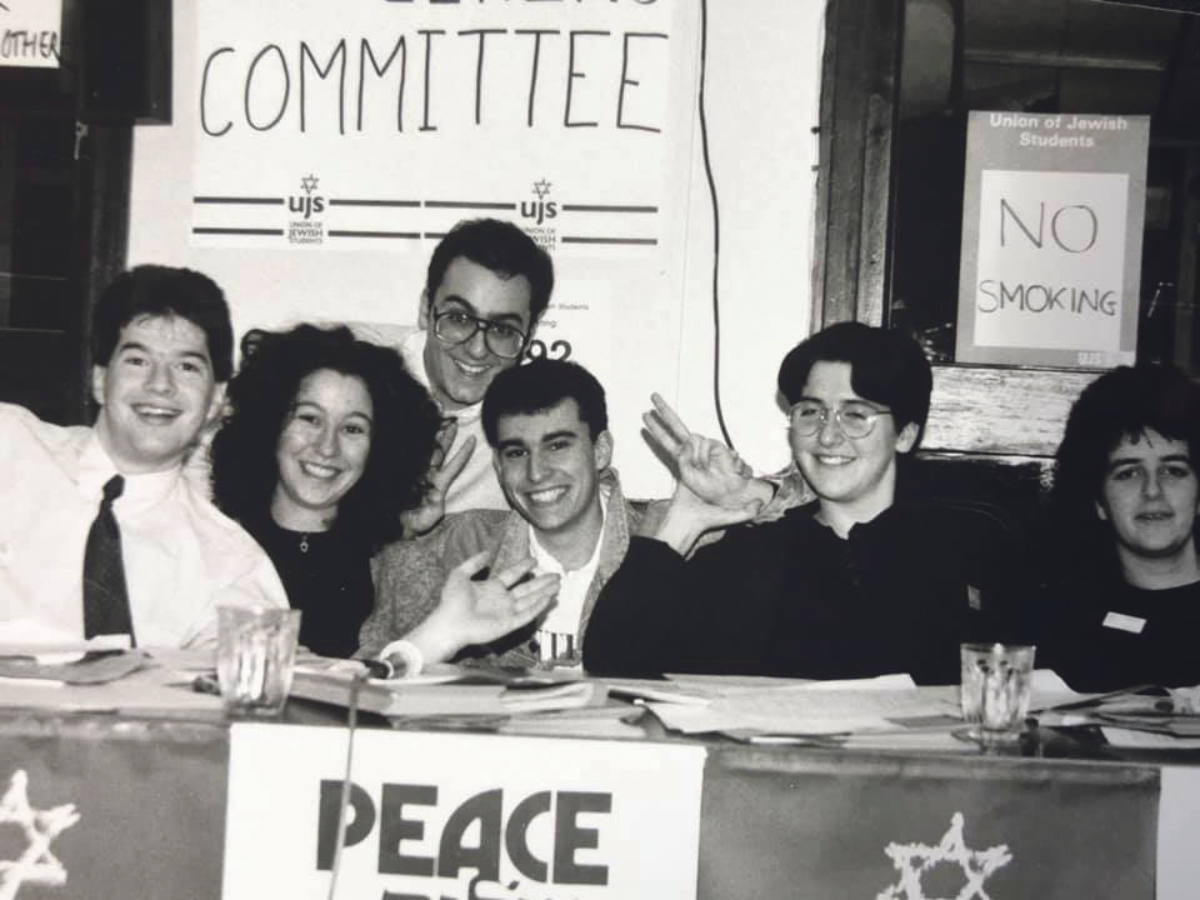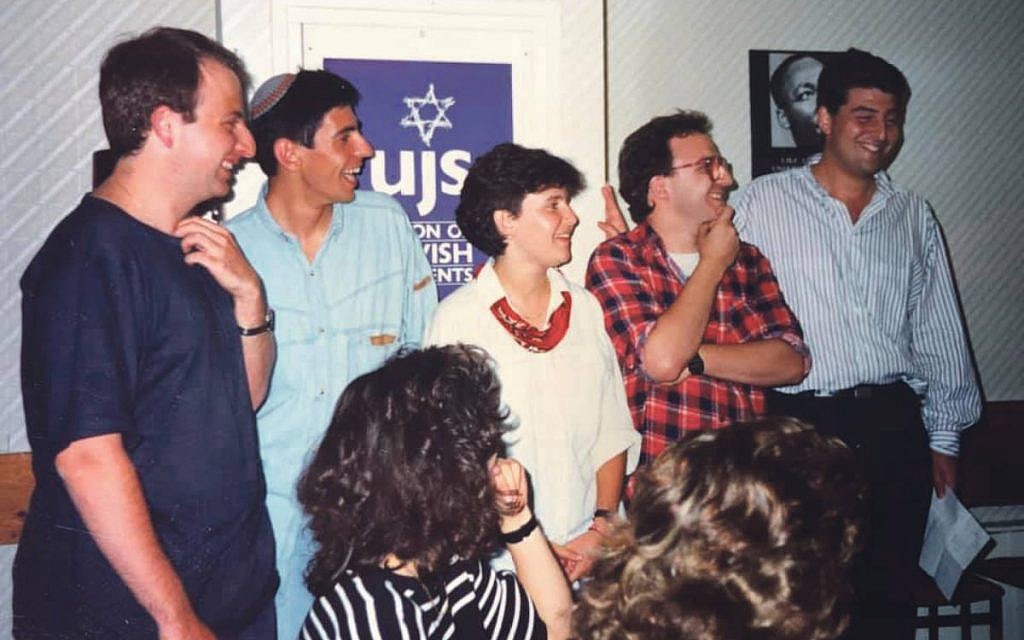SPECIAL REPORT: 100 years of UJS – the student century
As the Union of Jewish Students turns 100, we delve into the archives, from the early roots of Jewish student feminism and Limmud, to internal disputes and student union battles
As the Union of Jewish Students approaches its 100th birthday, the vault doors have been flung open and Jewish News invited in. A particularly well-documented period was the late 1970s and early 1980s.
Those active in student politics then would now be in their 50s and 60s. Among the nuggets we unearthed were the beginnings of Jewish student feminism, the birth of Limmud, the Oxford mansion left to students but sold off by Jewish leaders and the advent of computers – which students needed the United Synagogue to help them use
Beginnings of Jewish Student Feminism
Get The Jewish News Daily Edition by email and never miss our top stories Free Sign Up
In September 1980, Danny Ries described how she, Sarah Shaps and Erica Burman tried to start the first Jewish feminist group at that year’s Union of Jewish Students (UJS) conference. “The amount of ridicule and even hostility was surprising at the mention of the word ‘feminism’, from the women as well as the men,” she wrote. “We began wondering how much these students actually thought about their roles as Jewish ‘women’ in UJS. Still, three was a beginning. Approaching individuals away from conference, the reactions and responses were miraculously changed.”
She described grappling with the new group’s identity and rules. “For instance, should the emphasis be on the ‘Jewish’ or the ‘feminist’? What about men – should they be allowed to participate? What about non-students? To help and advise us, Erica invited Elena Moses from the Cambridge Jewish Socialist Group, as well as Shushana Simons, who co-founded the Jewish Feminist Group. I can’t begin to explain the feelings of renewed hope and anticipation – as well as apprehension – when we heard that they, too, were faced with much hostility and scepticism when they started out. The only thing to do is to grit your teeth and get on with it.”
The group launched at Hillel House with 20 participants, a mix of students, ex-students, would-be students and Jewish working women. “Opinions were shyly concealed at first, although remarkably similar,” Ries wrote. “By the end of the day, all hopes, worries and fears were forgotten – well, almost… We hadn’t decided what to do about the men/women invitees problem, the religious/secular bias, the student or non-student dilemma, nor had we set a date for the next seminar.”
Did it end there, with one meeting, or did someone continue it? Answers on a postcard.
Beginnings of Limmud
Alastair Falk, among the first Limmud coordinators, later led Britain’s Jewish education umbrella group Partnerships for Jewish Schools (PaJeS). Back in 1980, he wrote that British educators were planning something new.
In 1976, a group of students in America created a structure that totally changed the face of Jewish education in the USA. Called Coalition for Alternatives in Jewish Education (CAJE), it has now grown to the extent that its recent conference in California was attended by 1,200 Jewish educators. Not only was there a large spread of ages, experience and geographical origins, it spanned virtually the entire religious spectrum, from Reconstructionist to Lubavitch.
Inspired by the success of CAJE, a group of teachers and individuals in England are planning a similar non-sectarian educational venture in December. Called Limmud, it will be a four-day practical forum where approximately 40 sessions will be on offer, from ‘new methods of teaching Hebrew’ to ‘television in the Jewish classroom’.”
Falk said: “Limmud can cater for the specific Jewish educational problems faced by students, since one of its unique features is its open session policy. Anyone can offer to give a session at Limmud. The only criterion is that it is practical.
“UJS conference gave its support to the creation of a practical, community-wide educational forum where ideas, methods and materials could be shared freely, and where the needs and problems of those at the grassroots were the prime concern. With the creation of Limmud, this has happened. We believe students in Britain must be involved in this new development.”

One for Oxford’s Jewish students
Today, students at the University of Oxford have to pay up to £5,000 for 175 days’ food and lodgings at the more prestigious colleges. Yet for Jewish students it needn’t have been so. Oxford academic Dr Felix Sieburg, who had fled the Nazis, passed away in the late 1970s, leaving his large Oxford home “for the accommodation of Jewish students in Oxford”.
What happened? An Oxford student at the time wrote that “Dr Sieburg’s home was never let to Jewish students, and some months ago the trustees sold the property without consulting either the local Jewish society or the Hillel Foundation”.
Freda Silver, who then headed the Oxford Jewish community, said she and others had “a clear conscience” and “do not recognise any legal or moral obligation” to provide accommodation to Jewish students in Oxford. To add insult to injury, Dr David Lewis, an Oxford don and Jewish community trustee, said the house was sold “because it was not bringing in any money”. No, if the likes of Dr Lewis weren’t letting it out to students, it wouldn’t be. The then UJS president sighed. “At a time of anti-Zionism on campus,” he wrote, “it is sad to have to fight for the rights of Jewish students within our own community.”
Tough summer
Times appear to have changed. In 1981, student Mike Glass recalled his Israel Tour as “primarily concerned with seeing Israel in a different light, with the concentration on biblical connections in hotly-disputed territory… There were nine-hour walks in 95 degree heat in the Judean desert requiring ropes and pegs and having to swim through about 12 stagnant pools on our way to the Dead Sea”.
So, you’re a Zionist?
While Salford is today the beating heart of the north-west’s Jewish community, in 1976-77 Salford University Students Union said Zionism was “a discriminatory, racist and unjust ideology which discriminates between Jew and non-Jew” and “like apartheid… The essence of racism is the mythical belief in race superiority. The South African racists, the Zionists and the fascists all share this belief. Each professes to be the Chosen People”.

At Salford University, Zionist meetings were banned and the Jewish Society was forbidden to set up a bookstall or distribute pro-Israel leaflets. UJS fieldworker Alan Elsner wrote that similar anti-Zionist motions were put forward at Lancaster, York and Essex. “At York, the Jewish society was summoned to a meeting of the union council and asked if it was Zionist,” he wrote. “The society replied it was. The union baulked at the prospect of banning Jewish Society meetings. Eventually… the union voted that the Jewish Society was not Zionist, even though the society continued to maintain it was!”
Moving with the times
Our archive trawl uncovered the only known example of Jewish students needing the United Synagogue (US)’s help when it comes to technology. The UJS Report of 1989/90 noted that “the introduction of the new telephone system and computer/word processor has been a factor in the overall professionalisation of UJS, but there is still too much reliance on the US for guidance in using it”.
Jon Mendelsohn, Adam Rose, Stephen P. Kurer and Elliot Renton at Hayes conference centre

Thank you for helping to make Jewish News the leading source of news and opinion for the UK Jewish community. Today we're asking for your invaluable help to continue putting our community first in everything we do.
For as little as £5 a month you can help sustain the vital work we do in celebrating and standing up for Jewish life in Britain.
Jewish News holds our community together and keeps us connected. Like a synagogue, it’s where people turn to feel part of something bigger. It also proudly shows the rest of Britain the vibrancy and rich culture of modern Jewish life.
You can make a quick and easy one-off or monthly contribution of £5, £10, £20 or any other sum you’re comfortable with.
100% of your donation will help us continue celebrating our community, in all its dynamic diversity...
Engaging
Being a community platform means so much more than producing a newspaper and website. One of our proudest roles is media partnering with our invaluable charities to amplify the outstanding work they do to help us all.
Celebrating
There’s no shortage of oys in the world but Jewish News takes every opportunity to celebrate the joys too, through projects like Night of Heroes, 40 Under 40 and other compelling countdowns that make the community kvell with pride.
Pioneering
In the first collaboration between media outlets from different faiths, Jewish News worked with British Muslim TV and Church Times to produce a list of young activists leading the way on interfaith understanding.
Campaigning
Royal Mail issued a stamp honouring Holocaust hero Sir Nicholas Winton after a Jewish News campaign attracted more than 100,000 backers. Jewish Newsalso produces special editions of the paper highlighting pressing issues including mental health and Holocaust remembrance.
Easy access
In an age when news is readily accessible, Jewish News provides high-quality content free online and offline, removing any financial barriers to connecting people.
Voice of our community to wider society
The Jewish News team regularly appears on TV, radio and on the pages of the national press to comment on stories about the Jewish community. Easy access to the paper on the streets of London also means Jewish News provides an invaluable window into the community for the country at large.
We hope you agree all this is worth preserving.
- Students
- News
- Limmud
- Danny Ries
- Sarah Shaps
- Erica Burman
- Shushana Simons
- Jewish Feminist Group
- Hillel House
- Alastair Falk
- Partnerships for Jewish Schools (PaJeS)
- Alternatives in Jewish Education (CAJE)
- Reconstructionist
- lubavitch
- Dr Felix Sieburg
- Dr David Lewis
- Mike Glass
- Salford
- Salford University Students Union
- Zionism
- South Africa
- Salford University
- Union of Jewish Students (UJS)
-
By Brigit Grant
-
By Laurent Vaughan - Senior Associate (Bishop & Sewell Solicitors)
-
By Laurent Vaughan - Senior Associate (Bishop & Sewell Solicitors)
-
By Laurent Vaughan - Senior Associate (Bishop & Sewell Solicitors)
-
By Laurent Vaughan - Senior Associate (Bishop & Sewell Solicitors)






















